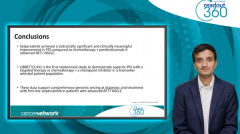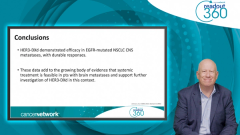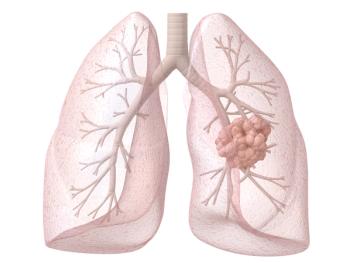
MARIPOSA: Amivantamab Plus Lazertinib in EGFR-Mutated Advanced NSCLC
Joshua K. Sabari, MD, reviews the primary results from the MARIPOSA study presented at ESMO 2023 looking at amivantamab plus lazertinib in EGFR-mutated advanced NSCLC.
Episodes in this series

This is a synopsis of a Readout 360 series featuring Sandip P. Patel, MD, of UC San Diego Moores Cancer Center; Joshua K. Sabari, MD, of NYU Langone’s Perlmutter Cancer Center; and Alexander I. Spira, MD, PhD, FACP, of Virginia Cancer Specialists.
Joshua K. Sabari, MD, a thoracic medical oncologist at NYU Langone Health Perlmutter Cancer Center, discussed updates in the treatment of non-small cell lung cancer (NSCLC) from the European Society for Medical Oncology (ESMO) 2023 conference. The first abstract he presented was the MARIPOSA trial, a global, randomized, phase 3 study of amivantamab plus lazertinib versus osimertinib as first-line treatment for patients with EGFR-mutated advanced NSCLC. The study was presented by Dr. Byung-Chul Cho.
Amivantamab, an EGFR and MET bispecific antibody, and lazertinib, a third-generation EGFR tyrosine kinase inhibitor (TKI) with CNS penetration, were compared to the standard of care, osimertinib, in the first-line setting. The MARIPOSA trial randomized over 1,000 treatment-naive patients with locally advanced or metastatic NSCLC harboring EGFR exon 19 deletions or L858R mutations to three arms: amivantamab plus lazertinib, osimertinib monotherapy (control arm), and lazertinib alone.
With a median follow-up of 22 months, amivantamab plus lazertinib showed a 30% reduction in the risk of disease progression or death compared to osimertinib (hazard ratio [HR], 0.70). The median progression-free survival (PFS) was 23.7 months for amivantamab plus lazertinib versus 16.6 months for osimertinib. Objective response rates were similar across both arms (85% for osimertinib and 86% for amivantamab plus lazertinib), but the median duration of response among confirmed responders was longer with amivantamab plus lazertinib (25.8 months) compared to osimertinib (16.8 months). Early data on PFS2 and overall survival also favored amivantamab plus lazertinib over osimertinib (HR, 0.75 and 0.8, respectively).
The safety profile of amivantamab plus lazertinib was consistent with prior reports, with frequent toxicities including infusion-related reactions, skin toxicities, and venous thromboembolism. Diarrhea was more common in the osimertinib arm. Venous thromboembolism, mostly grade 1 and 2, occurred early in treatment and was effectively managed with anticoagulation. Interstitial lung disease rates were low and similar across both arms.
Dr. Sabari concluded that amivantamab plus lazertinib was statistically superior to osimertinib, providing a clinically meaningful improvement in PFS with a higher duration of response and a favorable overall survival trend. The MARIPOSA trial establishes amivantamab plus lazertinib as a new first-line standard of care for EGFR-mutated NSCLC.
*Video synopsis is AI-generated and reviewed by Cancer Network editorial staff.
Newsletter
Stay up to date on recent advances in the multidisciplinary approach to cancer.























































